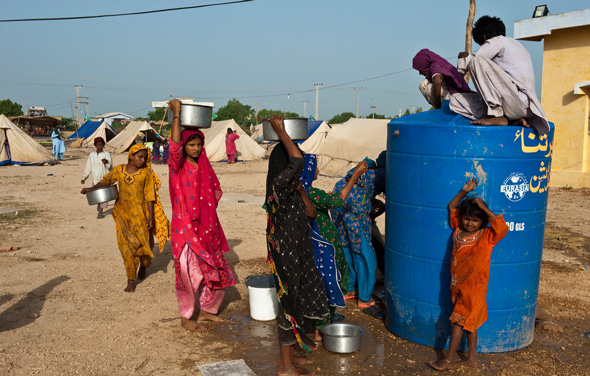Showing posts by Molly Shane.
-
Melanne Verveer and Others at Heinrich Böll Gender Equity and Sustainable Development Conference
›The Gender Equity and Sustainable Development conference, hosted last month by the Heinrich Böll Foundation, was a testament to the increasing importance of gender and sustainability within the international development community. Representatives from the U.S. government, UN, and countless international non-profits, aid organizations, and corporations demonstrated the vital need for collaboration and innovative action when working towards a more sustainable world.
The conference kicked off with an invigorating speech by the Honorable Melanne Verveer, U.S. Ambassador-at-Large for Global Women’s Issues, who called on the international community to acknowledge the “vital role that women can and must play in sustainable development.”
“Putting a spotlight on the critical role of women in stopping climate change will help to harness the immense human capacity of women worldwide,” said Verveer. By advocating for consideration of gender at every level – from grassroots organizing to policymaking – the ambassador painted a picture of a new era of sustainable development.
Step One: Recognize the Problem
A series of four panels followed the keynote address and focused on the intersections between gender inequity, the economy, trade, food and agriculture, and climate change.
There was clear consensus among all the participants that worldwide consciousness of gender inequity can lead to vast improvements in the status of women while also opening the door for new, innovative approaches to sustainable development. The 16 panel members represented numerous groups, from Oxfam America to Gender Action to the Stockholm Environment Institute, and all spoke to the importance of working for larger structural changes while simultaneously shifting more economic, social, and political power into the hands of women by any means possible.
The panelists described a world in which women represent a tremendous, untapped resource for change. Although women only own approximately one percent of titled land worldwide, they own close to 33 percent of business in the developing world and spend two-thirds of consumer dollars worldwide, which they tend to invest in sectors like health and education that benefit the larger community. Verveer said that data also shows women are more likely to pass environmental legislation and that forestry projects involving women have a higher rate of success.
Humanizing Climate Change
The big question of the conference seemed to be: in a world where women are disproportionately vulnerable to the effects of climate change, why aren’t women given more of a voice in the process of creating a more sustainable world?
Marie Brill, a senior policy analyst at Action Aid USA, pointed to the production of biofuels as a poignant example of a sustainable development plan that has had unintended negative consequences for women around the world. In the developing world, women are primarily responsible for food provisioning, yet many social and legal restrictions prevent women from owning land. If women had better access to land ownership and food insecurity would decrease, she said, and crops yields could increase by as much as 20 to 30 percent.
Foreign ownership of large tracts of land, common in the production of biofuels, makes land title even more difficult for women to acquire or maintain. The industry has also led to price spikes for staple crops like corn, said Brill, meaning poor women are sometimes unable to feed their families.
While biofuels provide an alternative fuel source, their production has been managed in a way that ignores the gender-specific implications of the process. By maintaining an awareness of gender, we can ensure that women do not become victims as we move towards a more sustainable world, Brill said.
Liane Schalatek, the associate director of the Heinrich Böll Foundation North America, suggested that a paradigm shift is needed regarding our approach to climate change.
Approaching climate change from a purely scientific and technological perspective is offensively simplistic, Schalatek said. “We need to humanize climate change and bring social equity into the discourse,” she said, emphasizing that “it is our obligation under international human rights objectives and vital to the success of sustainable development to take a rights-centered approach.”
Molly Shane was an intern for the Sierra Club’s Global Population and Environment Program.
Sources: Boston Consulting Group, Council on Foreign Relations, Food and Agriculture Organization of the United Nations, USAID, U.S. State Department, Women Deliver.
Photo Credit: “Climate Risk and Resilience: Securing the Region’s Future,” courtesy of the Asian Development Bank.





